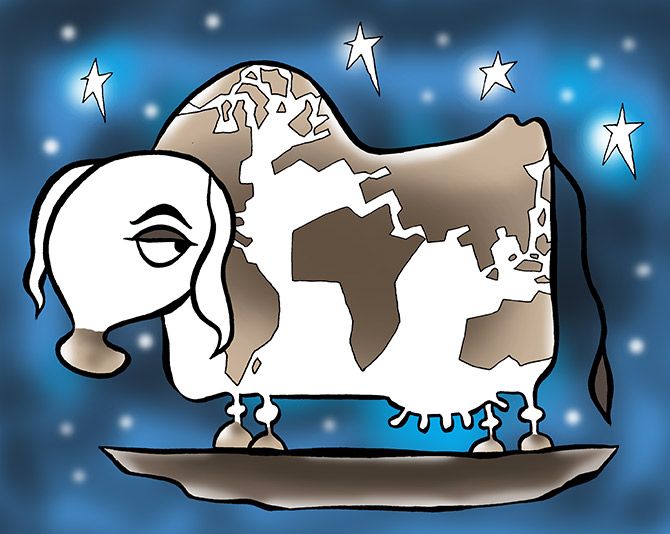'Many scholars have suggested that the importance of the cow and her association with the pantheon grew with the growing influence of the cult of Krishna,' says Arundhuti Dasgupta.
Illustration: Uttam Ghosh/Rediff.com

Going by the violence that has erupted over the cow, it would seem as if we are the only people who consider her sacred.
Far from it. Cows have sat on a holy pedestal across ancient civilisations.
Be it the Greek, Nordic or Egyptian, the cow has been goddess, protector, mother and sacred to her people.
In Norse mythology, the cow is the creator of the universe.
In the beginning there was Nifleheim, the world of mist with 11 poisonous rivers and a roaring maelstrom, and Muspell, the fire world where everything glowed and burned.
Between the two was a void called the Ginnungagap.
Over time, ice and fire met in this void and life emerged.
First there was Ymir, the ancestor of all giants, who was neither male nor female.
Next was born a hornless cow, called Audhumla.
More enormous than anything we have ever known or can imagine, she licked the salty ice for food and drink.
The milk from her udders nourished Ymir and he grew.
Slowly Audhumla licked people out from the blocks of ice; she dug out Buri, the ancestor of the gods Odin, Vili and Ve who killed Ymir to shape the world as we know it today.
In Greek mythology, cows were sun god Apollo's prized possessions.
There are two myths, both dealing with the stealing of Apollo's cattle.
One is about Hermes, who stole Apollo's herd when he was still an infant.
Apollo found him out, and was so enraged that he picked him up and barged into the court of Zeus.
Hermes denied his crime outright, but Zeus, even though he had a soft spot for his son, was not convinced.
Hermes then asked Apollo to listen to him play the lyre before he took away the cattle.
Apollo was so entranced that he gave him the cows in exchange for the lyre.
Another story is in Homer's Odyssey where Odysseus and his men, despite Zeus' warning, devour Apollo's herd.
That cost them their lives, although Odysseus manages to get his way around, as he always does.
Stealing cattle, coveting another god's herd are common themes in myth.
In the Indian context, the story about Kamadhenu, or the cow of plenty, is an example. She is also referred to as Surabhi.
Kamadhenu was in the possession of Vasishtha and was well looked after by the sage and his wife.
One day when they had a guest, the king Vishwamitra, she helped serve up a grand feast. Vishwamitra was so pleased that he asked for the cow as a gift.
Vasishtha refused and when Vishwamitra stole her, a battle followed.
Vishwamitra suffered for the rest of his life for having dared to take on the sage.
Cows were the equivalent of gold to pastoralists and as they grew more powerful, they imposed more stringent punishment on those who took them away or ate them.
Kamadhenu is said to have emerged during the churning of the ocean. And given the importance of the amrita manthan myth in Southeast Asia, the cow is viewed through a similar lens in this region too.
A few years ago, Sushma Swaraj, speaking about the holiness of the cow, said the greatness of the cow was acknowledged even in Vietnam, as its government had handed over a cow and a plot of land to its people to lift them out of poverty.
She also spoke about the greatness of the animal and how it was the one that would guide all souls across the Vaitarni when their time on earth is done.
True, but the point is that there are as many stories about divine eagles, serpents and goats in Indian mythology, but unlike the cow, they are not being protected by vigilantes.
And there was a time when cows were sacrificed too.
In the Katha Upanishad, Nachiketa questions his father, the sage Gautama, because the cows being sacrificed are just skin and bone.
Of what value are old cows, he asks to which his father angrily sacrifices his son to Yama.
The cow was sacred because she was valuable. Cows are not an avatar or the vahana of a god, the tried and tested route to divinity in Indian mythology.
Many scholars have suggested that the importance of the cow and her association with the pantheon grew with the growing influence of the cult of Krishna or the community of cow herders.
As their power grew, so did their wealth and the association of the bovine with the divine.











